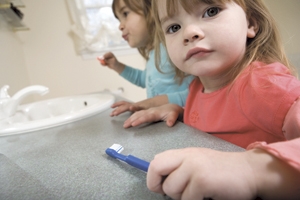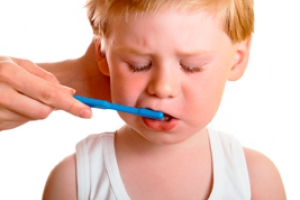
Did you know that your child’s asthma medicine can weaken healthy enamel, making teeth vulnerable to dental disease?
“Caries” is the term that dentists use to describe dental disease. You and I call them cavities. A study in the Journal of Clinical Pediatric Dentistry concluded that “asthmatic children had a high caries prevalence [that] increased with the severity of bronchial asthma [and] was highest in those taking medication in the form of syrup.”
My granddaughter suffers from asthma. She began taking albuterol syrup when she was about 6 months old. She began nebulizer (inhaled) treatments at 2. Until this year, dental visits showed nothing unusual. Now she’s 5 and getting her first permanent teeth. Her pediatric dentist found many cavities, and recommended two root canals and crowns. Shocked, we wondered why we hadn’t heard from a consulting pediatric dentist, not even her regular dentist or pediatrician, that asthma medicines may increase cavities in young children.
Since 2001, dental researchers have carried out several studies searching for a link between asthma and cavities with varying results. While the dental community decides where it stands on this issue, here are some practical things you can do to help protect your child against dental decay:
If your child drinks bottled water, substitute bottled water fortified with fluoride. Fluoride strengthens tooth enamel, which is why the Center for Disease Control (CDC) says fluoridated water is one of the ten greatest medical advances of the 20th century. The CDC credits fluoridated water with significantly reducing cavities in children who drink treated water. Since February 2011, the City of San Diego (including Coronado, Del Mar and Imperial Beach) has provided fluoridated drinking water.
Rinse your child’s mouth out after each nebulizer treatment, or, for older children, after using an inhaler. Asthma medicine may weaken tooth enamel, giving bacteria places to flourish. Rinse the nebulizer mask out after every use, too. Keep it as fresh as you can to eliminate medicine buildup that may increase the problem.
Keep the mouth hydrated with water or ice chips, not sugary drinks. Dry mouth, a side effect of some asthma medications, can ripen conditions for the bacteria that cause cavities. Ask your dentist about dry mouth medicines and whether they are appropriate for young children.
Ask your dentist about topical fluoride treatments and sealants. Use fluoride toothpaste beginning at the earliest possible age. Ask your dentist about prescription topical fluoride paste that your child can apply each evening after brushing. Use an over-the-counter fluoride mouthwash that is specifically formulated for children.
Tell your dentist that your child has asthma. Be persistent. Make sure she is aware of the potential risks and can monitor and modify your child’s treatment plan where necessary.
---------------------------------
Patricia Douglas is a freelance writer, mother of three and grandmother of five. She currently lives with her son and her 5-year-old granddaughter who suffers from asthma and a plethora of allergies.



















